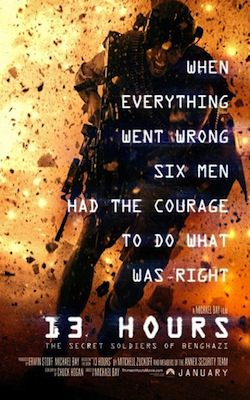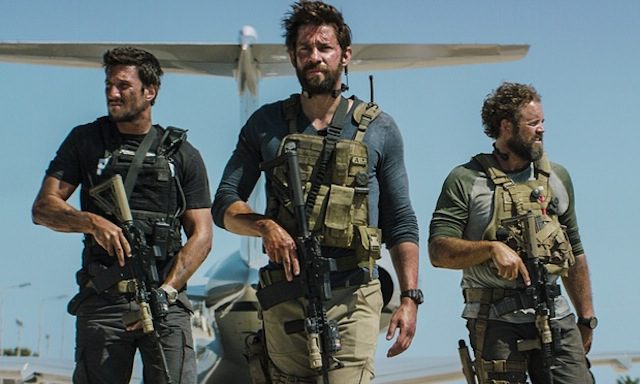By Emily Whalen
 “Forget it, Jake. It’s Chinatown,” Lawrence Walsh growls to Jake Gittes in the final moments of Chinatown, Roman Polanski’s iconic film noir about corruption and betrayal in Los Angeles. Walsh’s now-classic line reflects Jake’s utter disenchantment by the end of the film—he has has lost faith in the status quo, in honor, and even in love by the time he winds up in the lawless Chinese part of town. It’s a sentiment echoed again and again in Michael Bay’s 13 Hours: The Secret Soldiers of Benghazi. Throughout the movie, through explosions and dust and sweat, John Krasinski’s Jack Silva hears by way of explanation: “It’s Benghazi.” The message couldn’t be clearer: the rules don’t matter here.
“Forget it, Jake. It’s Chinatown,” Lawrence Walsh growls to Jake Gittes in the final moments of Chinatown, Roman Polanski’s iconic film noir about corruption and betrayal in Los Angeles. Walsh’s now-classic line reflects Jake’s utter disenchantment by the end of the film—he has has lost faith in the status quo, in honor, and even in love by the time he winds up in the lawless Chinese part of town. It’s a sentiment echoed again and again in Michael Bay’s 13 Hours: The Secret Soldiers of Benghazi. Throughout the movie, through explosions and dust and sweat, John Krasinski’s Jack Silva hears by way of explanation: “It’s Benghazi.” The message couldn’t be clearer: the rules don’t matter here.
Reactions to Michael Bay’s latest venture have so far cropped up along predictable lines. Some, looking to the film’s scrupulously non-political focus and standout performances by Krasinski and James Badge Dale, applaud the comparatively restrained, fact-driven story. Others challenge the film’s simplistic take on a complex geopolitical event, lacking historical context and rife with cultural assumptions. Michael Bay isn’t an auteur and nuance isn’t his strength—nor is it what most of his audience wants from a movie. But considering the tidal shifts in our current culture over war, over government, and over America’s place in the world, 13 Hours offers a provocative starting point for Bay’s applauders and scoffers to talk across the aisle.
The narrative follows a group of six ex-military contractors, hired to run security for a CIA annex in bullet-pocked Benghazi in 2012. Jack joins Dale’s Tyrone “Rone” Woods, on “one last job” because he needs the money—the economy at home is faltering. The contractors comprising the Global Response Staff (GRS) sweat away in a grubby CIA compound. The compound abuts “Zombieland,” the eerie village slaughter yard that seems to enjoy an abundance of ethereal breezes. Jack, Rone, and their crew of uniformly tall, rugged, and muscular contractors immediately clash with the pudgy CIA Station Chief, who sneers metaphorically and literally at the hired protection any chance he gets. This is one of the film’s major leitmotifs: the effete, bloated bureaucrat gets into the way of the seasoned, decisive GRS team at every turn of the plot, preventing them at best from doing good, at worst from doing their jobs.
When news of Ambassador Chris Stephens’s visit to Benghazi comes, the GRS team stops by the State Department’s diplomatic outpost, a well-appointed pleasure garden compared to Zombieland, to offer the Diplomatic Security (DS) team a gratis security assessment. The outpost is hopelessly vulnerable, another indication of bureaucratic—and departmental—incompetence. DS depends on a deeply unreliable local militia, the February 17th Martyrs’ Brigade, for the majority of their protection. Jack and his fellow mercenaries make a congenial offer to help in case a crisis crops up during the visit. Of course, a crisis develops.
The climax of the film comes on September 11, 2012. Crowds of armed, organized militants storm the diplomatic outpost, and the DS team issues a desperate call to the GRS guys: “If you guys don’t come now, we are going to fucking die.” Geared up and ready, the GRS team turns to the CIA Station Chief for an official go-ahead. But, concerned about chain of command and protecting his own agents, the Chief instead issues a “stand down” order to the GRS team. A tense twenty minutes passes. Finally, Rone bests the Chief in a contest of will, and the heavily armored contractors swing into action. Piling tragedy upon insult, the Chief’s delay means the GRS team loses the opportunity to save the life of Ambassador Chris Stephens, who perishes from smoke inhalation after the attacking militants and the Mediterranean wind turn the outpost into a hellish inferno.
Survivors of the real Benghazi GRS team—who collaborated with Bay’s scriptwriters—have been vocal with journalists like David Kirkpatrick about the “stand down” order. The film suggests the order virtually eliminated any chance of saving Stephens from an avoidable death. The film abstains from directly criticizing initial, inaccurate State Department and White House reports of the attack on Benghazi, which called the attack a spontaneous act of riot violence. It also mercifully avoids the political morass of Secretary Clinton’s email servers. The movie does, however, contradict 2014 reports to the House Armed Services Committee and the Senate Intelligence Committee, which quite clearly state that the CIA issued no such “stand down” order. The CIA itself has denied that the chief, who is still undercover, prevented the GRS team from rescuing their DS counterparts. It’s difficult for a secret agency to respond to such a public lashing, and viewers would do well to consider the order less a fact than an illustration of endemic problems in the way American government departments interact in foreign countries. Lack of coordination and competition for legitimacy, especially in conflict zones, carry real dangers.
The world of Benghazi is a bewildering, hostile world. Bay’s nearly two-and-a-half-hour long film effectively conjures up the fatigue and bafflement with which most Americans regard the Middle East. Friends look like—and can quickly become—dangerous foes. By its end, the viewer, like Silva and his comrades, longs for treehouses, neat lawns, and McDonald’s drive-throughs. More sensitive viewers might decry the movie’s failure to offer real context for the embassy attack, or to portray ordinary Libyans as more than potentially malevolent scenery in a movie about Americans in peril. Gaddafi ruled Libya with an iron fist for 34 years – yet the failures of the revolution look through Bay’s lens like moral failures of a people unready for self-rule. The film opens with a shaky montage depicting Gaddafi’s murder, but it delves no deeper into decades of Libyan history that might help a viewer understand why the 17 Feb Brigade melted away from the embassy doors on September 11, 2012.
Conscientious viewers might consider why the movie doesn’t move beyond standard tropes about the Middle East. Why do audiences still accept Arabs in Adidas sweatpants and battered AK-47s as an existential threat to five skilled warriors in head to toe body armor? Critics will decry the movie’s hyper masculine, anti-intellectual bent, but perhaps it is more useful to question how Jack, Rone, and their muscular friends became so cynical and battle-ready in the first place. The GRS and DS teams face a bleak and bloody night virtually alone: the contractors and agents rail against their isolation in between bouts of heavy shelling. In the end, the GRS team—and the audience—never receive a satisfactory explanation for the mighty American military’s absence. What policies and decisions placed the GRS team in Zombieland, beyond the protective reach of American military power?
It’s easy to dismiss 13 Hours as a superficial tribute to the kind of aggressive nationalism that undermines American credibility in the world. It’s also easy to praise the film’s veneration of military contractors who risked their lives and their careers to do the right thing. But discussion of 13 Hours should not stop there—it captures a moment in American culture, warts and all, that is worth interrogating from both sides of the aisle.





